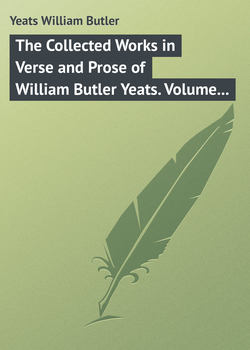Читать книгу The Collected Works in Verse and Prose of William Butler Yeats. Volume 8 of 8. Discoveries. Edmund Spenser. Poetry and Tradition; and Other Essays. Bibliography - Yeats William Butler, William Butler Yeats - Страница 6
DISCOVERIES
THE TREE OF LIFE
ОглавлениеWe artists have taken over-much to heart that old commandment about seeking after the Kingdom of Heaven. Verlaine told me that he had tried to translate ‘In Memoriam,’ but could not because Tennyson was ‘too noble, too Anglais, and, when he should have been broken-hearted, had many reminiscences.’ About that time I found in some English review an essay of his on Shakespeare. ‘I had once a fine Shakespeare,’ he wrote, or some such words, ‘but I have it no longer. I write from memory.’ One wondered in what vicissitude he had sold it, and for what money; and an image of the man rose in the imagination. To be his ordinary self as much as possible, not a scholar or even a reader, that was certainly his pose; and in the lecture he gave at Oxford he insisted ‘that the poet should hide nothing of himself,’ though he must speak it all with ‘a care of that dignity which should manifest itself, if not in the perfection of form, at all events with an invisible, insensible, but effectual endeavour after this lofty and severe quality, I was about to say this virtue.’ It was this feeling for his own personality, his delight in singing his own life, even more than that life itself, which made the generation I belong to compare him to Villon. It was not till after his death that I understood the meaning his words should have had for me, for while he lived I was interested in nothing but states of mind, lyrical moments, intellectual essences. I would not then have been as delighted as I am now by that guitar player, or as shocked as I am now by that girl whose movements have grown abrupt, and whose voice has grown harsh by the neglect of all but external activities. I had not learned what sweetness, what rhythmic movement, there is in those who have become the joy that is themselves. Without knowing it, I had come to care for nothing but impersonal beauty. I had set out on life with the thought of putting my very self into poetry, and had understood this as a representation of my own visions and an attempt to cut away the non-essential, but as I imagined the visions outside myself my imagination became full of decorative landscape and of still life. I thought of myself as something unmoving and silent living in the middle of my own mind and body, a grain of sand in Bloomsbury or in Connacht that Satan’s watch fiends cannot find. Then one day I understood quite suddenly, as the way is, that I was seeking something unchanging and unmixed and always outside myself, a Stone or an Elixir that was always out of reach, and that I myself was the fleeting thing that held out its hand. The more I tried to make my art deliberately beautiful, the more did I follow the opposite of myself, for deliberate beauty is like a woman always desiring man’s desire. Presently I found that I entered into myself and pictured myself and not some essence when I was not seeking beauty at all, but merely to lighten the mind of some burden of love or bitterness thrown upon it by the events of life. We are only permitted to desire life, and all the rest should be our complaints or our praise of that exacting mistress who can awake our lips into song with her kisses. But we must not give her all, we must deceive her a little at times, for, as Le Sage says in The Devil on Two Sticks, the false lovers who do not become melancholy or jealous with honest passion have the happiest mistress and are rewarded the soonest and by the most beautiful. Our deceit will give us style, mastery, that dignity, that lofty and severe quality Verlaine spoke of. To put it otherwise, we should ascend out of common interests, the thoughts of the newspapers, of the market-place, of men of science, but only so far as we can carry the normal, passionate, reasoning self, the personality as a whole. We must find some place upon the Tree of Life high enough for the forked branches to keep it safe, and low enough to be out of the little wind-tossed boughs and twigs, for the Phœnix nest, for the passion that is exaltation and not negation of the will, for the wings that are always upon fire.
